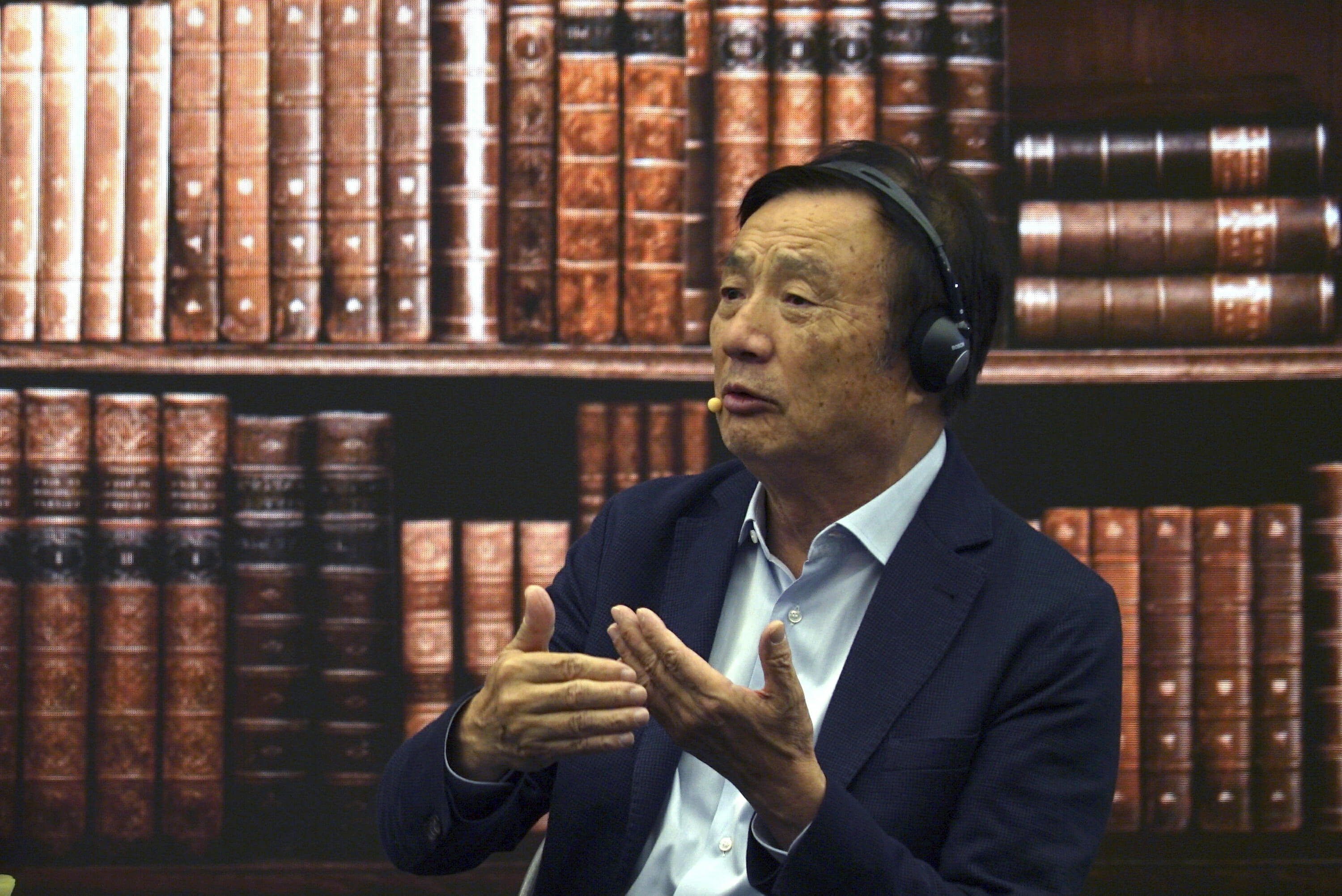
Huawei founder says revenue will be billions below forecast
SHENZHEN, China (AP) — Huawei’s founder said Monday that the Chinese telecom giant’s revenue will be $30 billion less than forecast over the next two years, as he compared the company to a “badly damaged plane” as a result of U.S. government actions against it.
“We never thought that the U.S.’s determination to attack Huawei would be so strong, so firm,” Ren Zhengfei, who is also the CEO, said during a panel discussion at the company’s headquarters in Shenzhen, China.
Ren said Huawei will reduce capacity and expects revenue of about $100 billion annually for the next two years, compared with $105 billion in 2018. In February, he said the company was targeting $125 billion in 2019.
Huawei’s overseas cellphone sales will drop by 40%, Ren said, confirming a Bloomberg report published Sunday. But the Chinese market is growing rapidly, he said, and Huawei will not allow restrictive measures to curb its research and development.
Huawei is embroiled in a trade dispute between China and the U.S., which has accused Chinese companies such as Huawei of committing forced technology transfers and stealing trade secrets. Last month, the U.S. placed Huawei on its “Entity List,” which effectively bars American companies from selling components to Huawei without government approval.
U.S. suppliers are taking a hit, too. Micron Technologies, Qualcomm, Qorvo and Skyworks Solutions have all listed Huawei as a major customer. Last week, chipmaker Broadcom reduced its 2019 revenue forecast by $2 billion, saying customers are trimming orders because of the trade tensions, including the U.S. curbs on sales to Huawei. Broadcom previously estimated full-year revenue of $24.5 billion. The research firm IHS Markit said Micron and Western Digital will also suffer, as they lose a leading buyer of memory chips and storage devices.
Huawei is expected to face challenges finding alternative suppliers for components, though IHS says Micron and Western Digital could eventually be replaced by South Korean and Taiwanese suppliers.
More broadly, U.S. businesses are expressing alarm at the Trump administration’s aggressive policies toward China. Hundreds of companies, trade groups and individuals have written the U.S. trade representative to protest the administration’s plan to extend tariffs of up to 25% on the $300 billion worth of Chinese sales to the United States that haven’t already been hit by import taxes.
Some are showing up in person for seven days of hearings that begin Monday. They want the administration to cancel the tariffs — or at least spare the imports they rely on.
Washington claims Huawei poses a national security threat because it is beholden to China’s ruling Communist Party. But American officials have presented no evidence of any Huawei equipment serving as intentional conduits for espionage by Beijing. Huawei’s placement on the Entity List is widely seen as intended to persuade resistant U.S. allies in Europe to exclude Huawei equipment from their next-generation wireless networks, known as 5G.
Ren denies that Huawei would share user data with the Chinese government if ordered to do so. He said Monday there are no backdoors in its equipment that anyone could access, and that Huawei is willing to enter into a no backdoor agreement with any nation that wants one.
Huawei has brought a lawsuit in the U.S. this March challenging the constitutionality of a national security law which prevents the U.S. government and its contractors from using Huawei equipment. The complaint, filed in Plano, Texas, where Huawei’s American operations are headquartered, alleges that the law singles out Huawei for punishment while denying the company due process.
The Wall Street Journal reported last week that Huawei is asking Verizon to pay licensing fees for more than 200 of its patents. While Huawei declined to comment on the matter, company spokesman Joe Kelly said it will hold a briefing later this month on being more aggressive about collecting intellectual property licensing fees.
Ren said during the panel discussion that Huawei will not use its many patents as a “weapon,” but did not rule out seeking royalties for usage.
He emphasized that Huawei will not stop collaborating with other countries and businesses.
The company’s current situation “is not caused by American businesses, but rather by certain politicians’ different perspectives,” Ren said. “I think both sides will suffer. No one will win.”
The panel, organized by Huawei, also included Nicholas Negroponte, the founder of the media lab at the Massachusetts Institute of Technology, and writer and investor George Gilder.
In December, Huawei Chief Financial Officer Meng Wanzhou — Ren’s daughter — was arrested in Vancouver at the request of U.S. authorities. The U.S. alleges that Meng misled American banks about the company’s business dealings with Iran, and that Huawei used a Hong Kong shell company to sell equipment in Iran in violation of U.S. sanctions. An extradition hearing is expected to begin in January.
___
Wang reported from Beijing.
The Western Journal has not reviewed this Associated Press story prior to publication. Therefore, it may contain editorial bias or may in some other way not meet our normal editorial standards. It is provided to our readers as a service from The Western Journal.
Truth and Accuracy
We are committed to truth and accuracy in all of our journalism. Read our editorial standards.
Advertise with The Western Journal and reach millions of highly engaged readers, while supporting our work. Advertise Today.












